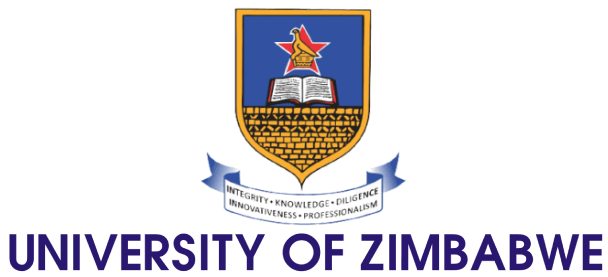
Professor Idah Sithole Niang
Phone: +263 733 412 801
E-mail: This email address is being protected from spambots. You need JavaScript enabled to view it.; This email address is being protected from spambots. You need JavaScript enabled to view it.; This email address is being protected from spambots. You need JavaScript enabled to view it.
Professor Idah Sithole-Niang is a Professor in the Department of Biochemistry, University of Zimbabwe, which she joined in 1992. She obtained a PhD in Biochemistry from Michigan State University where she specialized in molecular virology working with chicken and turkey herpesviruses developing subunit vaccines. Following her doctoral studies she pursued a post doctoral fellowship working on the genetics of photosynthesis in cyanobacteria. She teaches molecular biology to science and medical students. She conducts research on the genetic improvement of cowpea, and on bacterial metagenomics. She maintains a very keen interest on Biotechnology and Biosafety issues and has written authoritative articles on both subjects.
Research Interests:
- Cowpea Project: The project is currently on hold as we await funding when the economic situation improves in the country. On the broader scale the transgenic insect resistant cowpea expressing the Bt toxin gene (that was developed by Professor TJV Higgins, CSIRO, Australia) are undergoing a fourth round of efficacy trials in Nigeria, second year for Burkina Faso and an initial year for Ghana. This was part of a broader participation by the Cowpea community under the Network for the Genetic Improvement of Cowpea for Africa (NGICA) that I co-coordinate with Professor Larry Murdock of Purdue University, USA. This is welcome news as it means that procedures for evaluating transgenic cowpea are continually being improved for use by the rest of the community when the funding improves. Of importance to us will be the continuation of the enhanced nutritional quality studies using RNA interference (RNAi) as well as the generation of virus resistant cowpea.
- Molecular Biology Training Kit: Equipment has been acquired from the Kirkhouse Trust and is housed in the Department of Biochemistry under my leadership as PI and Mr. Hilary Zharo as technician. The toolkit based on the polymerase chain reaction will be used to teach molecular biology to relevant departments across campus. The first installation of the equipment is already here and the experiments have been validated.
- Extremophiles: Also planned for the future will be the continuation of the screening of the putative extremophiles that were uncovered from a Zimbabwean hotspring (location withheld as this is proprietary). This work is in collaboration with Dr. F. Chidzwondo. Drs. R. Mundembe and C.J. Zvidzai have since left. Of particular interest, are the DNA modifying enzymes as well as enzymes of importance to industry will be molecularly characterized for downstream application on a commercial scale. The mining sector is fast becoming attractive as well.
- Integrated Legume Improvement Project: This is a collaborative project of which I am the PI. Work is based on cowpea, bean and marama bean crop improvement. Five other countries are included, South Africa, Mauritius, Botswana Zambia and Namibia. Funding is pending from NEPAD BioFISA under phase II.
- Molecular Fingerprinting of Microbial Communities in sub-Saharan soils
This is a collaboration of several countries in sub-Saharan Africa. I am the National PI for the sampling and analysis of Zimbabwean soils to elucidate their microbial fingerprint using metagenomics in order to correlate soil type with microbial populations. This project offers an opportunity to network and also train students in cutting edge technologies in molecular ecology and phylogenetics. - GMASSURE: This is a regional biosafety project spearheaded by the Council for Scientific and Industrial Research (CSIR), South Africa with collaborators from the University of Zimbabwe and the University of Namibia. Work will include hosting a biosafety workshop in Zimbabwe for Policy and decision makers, and attending “hands on” training and lectures on genomics at the African Center for Gene Technologies, University of Pretoria, South Africa, with the goal of improving teaching in this rapidly developing area.
- Bioprospecting for anti-HIV molecules in wild plants of Zimbabwe: This project is under the leadership of Dr. F. Chidzwondo to look at microbicide sources amongst tree legumes. Phase I was funded by the NEPAD BioFISA and had numerous partners including SIRDC, CSIR South Africa and Botswana. Currently Phase II is pending
Introductory personal statement:
Idah Sithole-Niang is Professor at the University of Zimbabwe's Department of Biochemistry which she joined in 1992. She obtained a Phd in Biochemistry at Michigan State University (MSU) working on chicken and turkey herpersviruses. She pursued post doctoral training at the Plant Research Laboratory at MSU working on the genetics of photosynthesis in cyanobacteria. She has been working on the genetic improvement of cowpea for two decades and co-founded the Network for the Genetic Improvement of Cowpea for Africa (NGICA) with Prof. Larry Murdock of Purdue University, USA in order to bring useful and meaningful resources to this neglected crop. The cowpea project is now one of the flagship projects at the African Agricultural Technology Foundation (AATF) with Bt cowpea undergoing four seasons of confined field trials in Nigeria, two seasons in Burkina Faso and now destined for Ghana in July 2013.
Idah has worked on biotechnology and biosafety capacity development for 2 decades within Zimbabwe and several sub-Saharan African countries including, Malawi, Mozambique, Botswana, Zambia and Namibia. She acts as a Technical Advisor for sub-Saharan Africa on the Program for Biosafety Systems, and chairs the Board of Trustees of the AATF.
List of 12 best publications:
- Murdock, L., Sithole-Niang, I. & Higgins, T. J. V. (2013). Transforming the cowpea, an African orphan staple crop grown predominantly by women. In D. Bennett and C. Jennings (Eds.), Successful Agricultural Innovation in Emerging Economies: New Genetic Technologies for Global Food Production (pp. 221-232). Cambridge: Cambridge University Press.
- Mundembe, R., R.A Allison and I. Sithole-Niang. 2011. Genetic Engineering for resistance to viruses. Ed. Hugo A. Barrera-Saldaña: In Genetic Engineering - Basics, New Applications and Responsibilities. Intech Press, Rijeka, pp121-144. ISBN 978-953-308-81-5.
- Mundembe, R., A. Matibiri and I. Sithole-Niang. 2009. Transgenic plants expressing the Cowpea aphid borne mosaic potyvirus coat protein gene predominantly convey the delayed symptom development phenotype. African Journal of Biotechnology Vol. 8 (12) 2682-2690.
- Murdock, L.L., Coulibaly, O., Higgins, T.J.V., Huesing, J.E., Ishiyaku, M and Sithole-Niang, I. 2008. Cowpea. Edited by Chittaranjan Kole and Timothy C. Hall. Compendium of Transgenic Crop Plants: Transgenic Legume Grains and Forages. Blackwell Publishing, Oxford, pp23-56. ISBN 978-1-405-16924-0
- Mlotshwa, S., J. Verver, I. Sithole-Niang, K., Gopinath, J. Carette, Ab van Kammen and J. Wellink. 2002. Subcellular Location of the Helper Component-Proteinase of Cowpea Aphid-Borne Mosaic Virus. Virus Genes 25 (2) 207-216.
- Mlotshwa, S., I. Sithole-Niang, Ab van Kammen and J. Wellink. 2002. Cloning and sequence of the helper-component proteinase of a Zimbabwe isolate of cowpea aphid-borne mosaic virus. Archives of Virology 147: 1043-1052.
- Mlotshwa, S., J. Verver, I. Sithole-Niang, M. Prins, Ab van Kammen and J. Wellink. 2002. Transgenic Plants Expressing HC-Pro Show Enhanced Virus Sensitivity While Silencing of the Transgene Results in Resistance. Virus Genes 25 (1) 45-57.
- Sithole-Niang, I, T. Nyathi, D. P. Maxwell and T. Candresse. 1996. Sequence of the 3’ terminal region of a Zimbabwean isolate of cowpea aphid-borne mosaic virus (CABMV). Archives of Virology 141: 935-943.
- Smart, L.B., N.R. Bowlby, S.L. Anderson, I. Sithole, and L. McIntosh. 1994. Genetic manipulation of the cyanobacterium Synechocystis sp. PCC 6803: Development of strains lacking PSI for the analysis of mutations in PSII. Plant Physiology 104:349-354.
- Debus, R.J., B.A. Barry, I. Sithole, G.T. Babcock, and L. McIntosh. 1988. Directed mutagenesis indicates that the donor to P680+ in Photosystem II is tyr-161 of the D1 polypeptide. Biochemistry 27:9071-9074.
- Sithole, I., L.F. Lee, and L.F. Velicer. 1988. Synthesis and processing of the Marek's disease herpesvirus B antigen glycoprotein complex. Journal of Virology 62: 4270-4279.
- Isfort, R.J., I. Sithole, H.J. Kung, and L.F. Velicer. 1986. Molecular characterization of Marek's disease herpesvirus B antigen. Journal of Virology 59:411-419.
